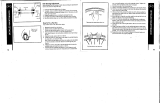
4
TO ENSURE SAFETY
TO ENSURE SAFETY
WARNING
•
When installing components, be sure to follow the instructions that are given in the instruction manuals.
It is recommended to use genuine SHIMANO parts only. If parts such as bolts and nuts become loose or damaged, the bicycle may suddenly fall over,
which may cause serious injury.
In addition, if adjustments are not carried out correctly, problems may occur, and the bicycle may suddenly fall over, which may cause serious injury.
•
Be sure to wear safety glasses or goggles to protect your eyes while performing maintenance tasks such as replacing parts.
Be sure to also inform users of the following:
•
Before use, check the wheels to make sure that there are no bent or loose spokes, dents, scratches or cracks on the rim surface. Do not use the wheel if
any of these problems are found. The wheel may break, and you may fall. In the case of carbon wheels, check also that there is no carbon peeling or
cracking.
•
The tires should be inflated to the pressure indicated on the tires or rim before use. If the maximum pressures indicated on the tires and rims differ, be
sure not to exceed the maximum pressure with the lower value. A higher pressure than indicated can cause a sudden puncture and/or sudden release
of the tire, which can result in serious injury.
WH-RS700-TL: Maximum pressure = 8 bar / 116 psi / 800 kPa
•
If the quick release mechanism is not used correctly, the wheel may come off the bicycle and serious injury could result. Read the manual for the quick
release mechanism thoroughly before use.
•
For ROAD wheel sets, these wheels are designed for riding on paved surfaces. If the wheels are used on unpaved surfaces, the wheels may become
bent or damaged, and accidents may result.
•
Check that the wheels are fastened securely before riding the bicycle. If the wheels are loose in any way, they may come off the bicycle and cause
serious injury.
< Clincher wheel / Tubeless wheel >
•
The hollow on the opposite side to the valve hole is an indicator for the amount of rim wear. If this hollow can no longer be seen, stop using the rim.
If you continue using the rim, it may break, and the bicycle may fall over and an accident may result.
< Tubeless wheel >
•
The tires should be installed and removed by hand.
If this is difficult, a plastic tire lever for tubeless wheels may be used. In such cases, be sure to check that the rim surface has not been dented,
scratched, or cracked as there is a risk of causing damage to the air seal between the tire and the rim, which would result in air leakage. For carbon
rims, check that there is no carbon peeling or cracking etc. Finally, make sure there is no air leakage.
< Tubular wheel >
•
Before riding, check that the tires are securely glued to the rims. If the tires come off while riding, you may fall and get severely injured.
•
If the braking surfaces of the carbon fiber rims become extremely worn and the rims appear to have become deformed, stop riding the bicycle. If you
continue to ride the bicycle in this condition, it may fall over and serious injury may occur as a result.
For Installation to the Bicycle, and Maintenance:
•
Do not use in combination with bottom link-type suspension forks. With these types of forks, when the brakes are applied, the clearance between the
hub axle and the brake shoes can change due to the operation of the suspension and the brake shoes may touch the spokes.






















